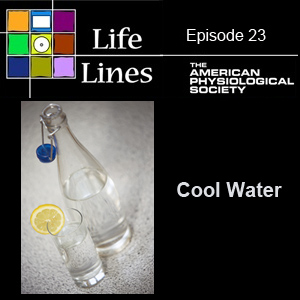
Life Lines - The Podcast of The American Physiological Society
Life Lines is a general interest monthly science podcast of The American Physiological Society. Visit us online at www.lifelines.tv.
- Update frequency
- every 28 days
- Average duration
- 19 minutes
- Episodes
- 30
- Years Active
- 2007 - 2010

Episode 29: Outtakes

Episode 28: 'Tis the Season That's Hard on Your Heart
Heart attacks peak during the winter months and cold weather has been thought to be the primary culprit. But cardiologist Robert Kloner of the Keck School of Medicine and Good Samaritan Hospital foun…

Episode 27: When the Sense of Smell Fails
What would it be like to live without being able to detect any odors? For one thing, Thanksgiving would be much less enjoyable, perhaps disturbingly so. In this episode, we talk to Robert I. Henkin o…

Episode 26: Invention and Impact of Ultrasound
Dean Franklin developed the first instruments to measure blood flow and the changes in diameter of the pulsating heart in conscious animals. He also pioneered the use of radio waves to measure heart …

Episode 25: EleComm
You've heard the word telecomm? In this episode, we are going to coin a new word: elecomm, shorthand for elephant communication. Caitlin O'Connell-Rodwell is a Stanford University professor and the a…

Episode 24: Pregnancy and Exercise
Episode 24: Pregnancy and ExerciseWhen a pregnant woman exercises, is it good for her fetus? That is the question that researchers Linda May of the Kansas City University of Medicine and Biosciences …

Episode 23: Cool Water
Three physiologists tell us why the prescription "drink when you are thirsty" is usually the best guideline for deciding when and how much to drink. We will talk to Heinz Valtin of Dartmouth Medical …

Episode 22: Laughter: Good Medicine?
There is nothing like a good laugh, is there? It not only feels great to laugh, it can feel great to hear other people laugh. Beyond brightening the mood, can laughter provide tangible health benefit…

Episode 21: Blood Pressure and the Brain
Did you know that there is a sensor in the nerve endings in the carotid artery that rapidly lowers blood pressure when stimulated? This discovery may one day allow people who are hypertensive to lowe…

Episode 20: Celiac Research Update
Celiac Update. Celiac disease is an uncontrolled immune response to wheat gluten and similar proteins of rye and barley. In those who have celiac disease, gluten can damage the small intestine, inhib…

Episode 19: The Genetics of Exercise
Have you ever had an experience like this: You and a friend start jogging together. Neither of you have been exercising much, but after a few days, your friend is easily striding along as you wheeze,…

Episode 18: Where Love Begins: In the Brain
Lucy Brown, a neuroscientist at the Albert Einstein School of Medicine, has studied romantic love using functional magnetic resonance imaging. Dr. Brown will talk about her studies on what happens in…

Episode 17: Environmental Cardiology
Accumulating evidence indicates that an increase in particulate air pollution is associated with an increase in heart attacks and deaths. In this episode, we'll talk to Aruni Bhatnagar of the Univers…

Episode 16: Circadian Rhythm & Jet Lag; Exercise and Appetite
We’ll start this episode by talking about clocks, but not the type of clock that ticks away on your wall. Instead, we’ll talk about the biological clocks that tick inside us. Clifford Saper of the Be…

Episode 15: Can Turkey Make You Sleepy?
Why do we feel sleepy after a big Thanksgiving meal? Is there something in the turkey? Are cranberries good for our kidneys? These are some of the questions our experts will explore. Chris I. Cheesem…

Episode 14: Halloween Science
Halloween is the theme for October, so we'll talk about sleep paralysis, a condition that has been associated with stories of demon attacks during the night. We'll talk to Allan Cheyne of the Univers…

Episode 13: Is Quercetin a Flu Fighter?
Mice are less susceptible to the flu when they eat quercetin, a substance that occurs in fruits and vegetables. Researcher J. Mark Davis will talk about his study on stressful exercise, quercetin and…

Episode 12: The Brain and Fetal Alcohol Syndrome
The Buzz in Physiology: (Starts at 2:01) A quick look at studies from APS journals that have been in the news.The Accidental Mind: (Starts at 4:17) How is your brain like an ice cream cone? David Lin…

Episode 11: Athletic Performance and Caffeine
The Buzz in Physiology: (Begins at 1:34) A quick look at studies from APS journals that have been in the news.Athletic Performance and Caffeine: (Begins at 3:05) Taking caffeine and carbohydrates tog…

Episode 10: Hydrogen Sulfide - What a Gas
Segment 1: What a Gas. University of Alabama – Birmingham researchers Jeannette Doeller and David Kraus talk about the amazing properties of hydrogen sulfide gas. Although it’s lethal in even minute…